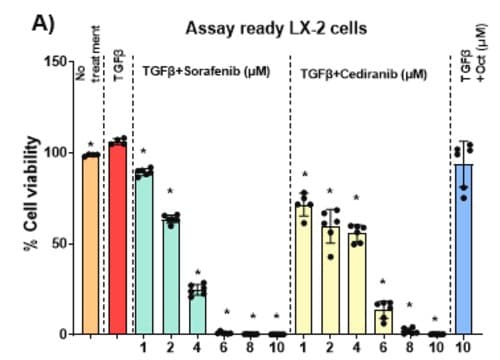MTOX1013
HepaRG™ Cells AHR (-/-)
human female liver (hepatocarcinoma and hepatitis C tumor)
Sign Into View Organizational & Contract Pricing
All Photos(1)
About This Item
UNSPSC Code:
12352207
NACRES:
NA.81
Recommended Products
General description
HepaRG is a human hepatoma cell line. The cells possess a pseudodiploid karyotype and have been characterized as an oval ductular bipotent hepatic cell line as they have the ability to differentiate into both biliary and hepatocyte lineages in the presence of DMSO. HepaRG AHR knockout cells express the major xenobiotic sensors (PXR and CAR), drug transporters, phase I and II drug metabolizing enzymes as well as key hepatic transcription factors involved in stress response pathways.
Application
See technical bulletin for detailed protocols
Features and Benefits
HepaRG cells are the most metabolically active human hepatocyte cell line developed to date. These the cells are suitable for a wide variety of studies for drug metabolism, CYP induction, metabolism-mediated toxicity, transporter, and hepatotoxicity. - Sigma′s HepaRG AHR Knockout (KO) allows conclusive identification of CYP1A1 and CYP1B1 induction through AHR activation.
Zinc finger nucleases (ZFN) mediated Knockout of AHR (AHR) gene.
- The frame-shift mutation of AHR gene was confirmed by fragment length analysis and DNA sequencing.
- Loss of functionality was confirmed by loss of response to inducers of cytochrome P450 activity.
Quality
Tested for Mycoplasma, sterility, post-freeze viability, short terminal repeat (STR) analysis for cell line identification, cytochrome oxidase I (COI) analysis for cell line species confirmation.
Legal Information
Exhibit 1: ADME/Tox cell lines license
Exhibit 2: HepaRG limited use license
Exhibit 2: HepaRG limited use license
HepaRG is a trademark of BioPredic International company
Disclaimer
RESEARCH USE ONLY. This product is regulated in France when intended to be used for scientific purposes, including for import and export activities (Article L 1211-1 paragraph 2 of the Public Health Code). The purchaser (i.e. enduser) is required to obtain an import authorization from the France Ministry of Research referred in the Article L1245-5-1 II. of Public Health Code. By ordering this product, you are confirming that you have obtained the proper import authorization.
Storage Class Code
12 - Non Combustible Liquids
WGK
WGK 3
Flash Point(F)
Not applicable
Flash Point(C)
Not applicable
Certificates of Analysis (COA)
Search for Certificates of Analysis (COA) by entering the products Lot/Batch Number. Lot and Batch Numbers can be found on a product’s label following the words ‘Lot’ or ‘Batch’.
Already Own This Product?
Find documentation for the products that you have recently purchased in the Document Library.
Dániel Szöllősi et al.
PloS one, 11(1), e0146066-e0146066 (2016-01-05)
Understanding of multidrug binding at the atomic level would facilitate drug design and strategies to modulate drug metabolism, including drug transport, oxidation, and conjugation. Therefore we explored the mechanism of promiscuous binding of small molecules by studying the ligand binding
Hong Feng Zhang et al.
Alcoholism, clinical and experimental research, 36(11), 1873-1881 (2012-04-11)
During the course of alcohol-induced liver damage, hepatic stellate cells are transformed into proliferative, fibrogenic, and contractile myofibroblasts. Aryl hydrocarbon receptor (AhR) is a transcription factor that controls the expression of genes involved in the metabolism of xenobiotics, inflammation, cell
Ziyu Liu et al.
Journal of molecular histology, 44(4), 455-461 (2013-04-03)
The aryl hydrocarbon receptor (AhR) is a ligand-activated transcription factor implicated in multiple cellular processes and its expression has been shown to play a critical role in tumorigenesis. However, the role of AhR in tumorigenesis of hepatocellular carcinoma remains unclear.
E F O'Donnell et al.
Cell death & disease, 5, e1038-e1038 (2014-02-01)
Identification of new molecular targets for the treatment of breast cancer is an important clinical goal, especially for triple-negative breast cancer, which is refractory to existing targeted treatments. The aryl hydrocarbon receptor (AhR) is a ligand-activated transcription factor known primarily
Marc Le Vee et al.
Toxicology in vitro : an international journal published in association with BIBRA, 24(6), 1775-1781 (2010-07-14)
Aryl hydrocarbon receptor (AhR) is a drug-sensing receptor activated by environmental contaminants such as 2,3,7,8-tetrachlorodibenzo-p-dioxin (TCDD), and is known to drive regulation of target genes in various human cell types. Its involvement in TCDD-mediated regulation of target genes in human
Our team of scientists has experience in all areas of research including Life Science, Material Science, Chemical Synthesis, Chromatography, Analytical and many others.
Contact Technical Service








